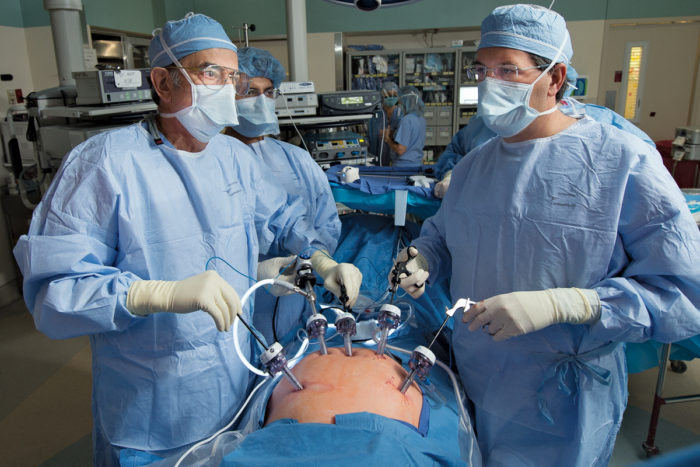Addressing pancreatic cancer on all fronts
Washington University School of Medicine specialists collaborate to approach pancreatic cancer treatment from multiple angles

Washington University surgeons Steven Strasberg, MD, left, and David Linehan, MD perform the Whipple procedure. Image courtesy of Tim Parker.
Pancreatic cancer is one of the most difficult cancers to diagnose. So specialists at the Alvin J. Siteman Cancer Center at Barnes-Jewish Hospital and Washington University School of Medicine battle the disease on several fronts:By closely coordinating care, enrolling many patients in clinical trials and collaborating on research that may someday provide treatment breakthroughs.
The prognosis for pancreatic cancer depends on the cancer type and whether the disease has metastasized. Most start in exocrine pancreas cells that secrete enzymes to help digest food. The cancer then spreads to other organs before symptoms occur. As a result, the overall survival is only 6 percent at five years.
In about 20 percent of patients, cancer is confined to the pancreas and can be treated with surgery, radiation and chemotherapy. Another 30 to 40 percent have locally advanced disease, which has not spread to other organs but involves surrounding blood vessels that supply blood to the intestines. Radiologists try to shrink these tumors so surgeons can remove them. In patients whose cancer has spread, medical oncologists offer palliative treatment to help relieve pain and prevent suffering.
A team approach
“The team approach distinguishes us from lower-volume centers,” says David Linehan, MD, head of the Section of Hepatobiliary-Pancreatic and Gastrointestinal Surgery. “The pancreas is one of the top-accruing disease sites for Siteman trials, with more than 100 patients recruited every year to therapeutic clinical trials. Our surgeons annually do 100 to 125 Whipple procedures, a complex operation we perform safely to remove cancer in the head of the pancreas.” The Siteman Cancer Center, where the procedure is performed, is one of the highest volume centers for this type of surgery nationwide.
Attacking from multiple angles
Oncologists attack pancreas cancer from various angles. Linehan helped lead a study examining the role of myeloid cells, which spread from the bone marrow to cause tumor growth. He also leads a clinical trial that combines use of the drug FOLFIRINOX with an investigational drug that prevents myeloid cells from spreading to the tumor.
Medical oncologist Andrea Wang-Gillam, MD, leads a trial examining proteins critical for pancreatic cancer development and changes in the proteins when patients receive FOLFIRINOX. The long-term goal is to develop a personalized cancer treatment.
Radiation oncologists at Siteman are also using new techniques to deliver very precise high-dose radiation along with full-dose chemotherapy.







